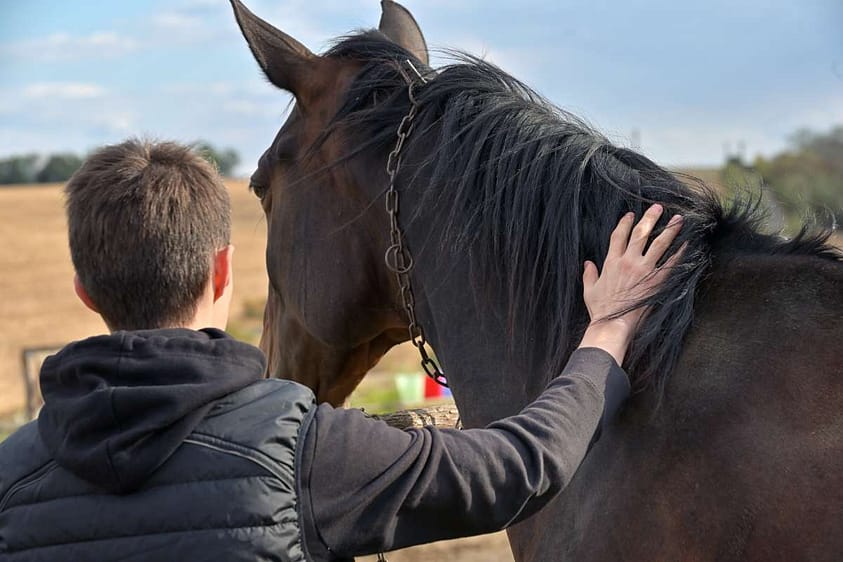Equine therapy is one option and type of teen therapy that clients may consider when looking for substance abuse treatment. Substance use disorders come in many forms. However, animal caretaking through equine therapy helps teach responsibility, awareness, and empathy during the recovery process. At Foothills at Red Oak Recovery, our team would be happy to talk to you about how equine therapy for teens can help your child or someone you love. Contact our team today at 866.300.5275 for more information about our equine therapy program.
What Is Equine Therapy?
Equine therapy is a form of animal-assisted therapy in which clients work with horses under the watchful eye of therapists and farmhands. The client works with a horse and therapist throughout the therapy to improve interactions with those around them, allowing them to make real change.
Every session is a little different, but one of the priorities is to help take care of the horse. Animal caretaking teaches fundamental, applicable skills. If the client doesn’t provide care to the animal, then it goes without for the session, which teaches responsibility and consequences. However, there isn’t any real risk to the animal during these treatment sessions.
What Happens During Equine Therapy?
Equine therapy methods may vary from one treatment facility to another, but there is a basic understanding of what happens in most cases.
During equine therapy, each lesson usually begins with grooming the horse. This gives the clients time to get used to being around horses, allowing them to overcome any fear they may have of the animal. Foothills at Red Oak uses only gentle horses in therapy sessions because trust is of the utmost importance.
After this, the typical activities include steps such as:
- Walking the horse around a pen for exercise
- Haltering a loose horse
- Cleaning the horse’s hooves
- Building an obstacle to have the horse jump or walk around, as to become a team
Doing these small tasks helps the client and horse build a bond. Then, the therapist’s job is to come back to the individual or group therapy sessions to talk about what happened during the equine therapy session and how to relates to the recovery process.
How Does a Horse Help with Cognitive Therapy?
One of the benefits of equine therapy is that horses sense danger and respond appropriately to changes in the teen’s mood. Individuals working with these horses may notice changes in the horse because of fear. Alternatively, they may identify those feelings in themselves if the horse reacts to them.
This treatment is often necessary because focusing on the animal’s apprehensions can help take the focus off oneself and place it onto the animal instead. Additionally, reducing anxious responses and concentrate on taking action can help many patients deal with anxiety and co-occurring mental health issues.
Horses are also beneficial as they are unbiased and nonjudgmental. They provide solid feedback and mirroring of the emotions of anyone working with them. This mirroring may help some clients build up confidence as they work toward their sustained sobriety.
Contact Foothills at Red Oak Recovery for Teen Therapy Options
At Foothills at Red Oak Recovery, we know how hard it can be to find the right treatment options for teens going through substance use issues or dealing with co-occurring disorders. Equine therapy for teens may be the right choice for some. Animal caretaking is a good way to learn about yourself and also about caring for other living creatures.
If this sounds like the kind of program that a teen you love would benefit from, give us a call at 866.300.5275. We can help you find the right teen treatment options to help your child or a teen you know get on the path to a healthier, happier life.





